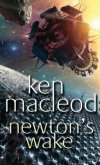Newton’s Wake is set in a post singularity universe populated by a somewhat quirky collection of four different factions: America Offline – American farmers who escaped the ‘Hard Rapture’ largely due to their being almost entirely disconnected, and who still prefer to farm rather than get involved with technology; the Knights of the Enlightenment – Indian and Japanese martial artists interested in the remnants of post hard rapture technology but wary of it; the DK – descendants of Chinese and Korean communists who live by the rule of self-reliance and who strive to reverse engineer the remnants of hard rapture technology; and finally the Carlyles – descendants of a Glaswegian gang of criminals who now control a network of wormholes left behind by the hard rapture. The main protagonist, Lucinda Carlyle, is a member of the latter group who discovers a third faction, descendants of the European soldiers who fought in the final war that created the hard rapture singularity and who had until now believed they were the sole survivors of the human race.
The universe MacLeod has created in Newton’s Wake is distinctly quirky and, whilst the various factions each have very different political structures and considering Macleod’s tendency to get on his political soap box, it is rather surprising that he treats these aspects with a distinctly light touch. He seems to have had particular fun in his creation of the Carlyles (bearing in mind he spent his university years in Glasgow) but all of the factions felt just a little tongue in cheek. MacLeod was a good friend of Iain M Banks and I felt there was a distinct feel of that same, often dark, humour for which Banks is so well known. Whatever its origin it worked exceptionally well for me and frequently had me chuckling helping make this book an extremely enjoyable read.
It is not, however, a comedy but a moderately hard science fiction look at the possible aftermath of a singularity and technology left behind that is so far beyond the survivors’ understanding to be effectively magic. A fast paced action story set in an interesting universe, Newton’s Wake is a great read that packs an awful lot into its standalone three hundred pages. In these days of doorstop books set in seemingly never ending series it provides the reader with a real breath of fresh air.
4/5 stars
The universe MacLeod has created in Newton’s Wake is distinctly quirky and, whilst the various factions each have very different political structures and considering Macleod’s tendency to get on his political soap box, it is rather surprising that he treats these aspects with a distinctly light touch. He seems to have had particular fun in his creation of the Carlyles (bearing in mind he spent his university years in Glasgow) but all of the factions felt just a little tongue in cheek. MacLeod was a good friend of Iain M Banks and I felt there was a distinct feel of that same, often dark, humour for which Banks is so well known. Whatever its origin it worked exceptionally well for me and frequently had me chuckling helping make this book an extremely enjoyable read.
It is not, however, a comedy but a moderately hard science fiction look at the possible aftermath of a singularity and technology left behind that is so far beyond the survivors’ understanding to be effectively magic. A fast paced action story set in an interesting universe, Newton’s Wake is a great read that packs an awful lot into its standalone three hundred pages. In these days of doorstop books set in seemingly never ending series it provides the reader with a real breath of fresh air.
4/5 stars
Last edited:


